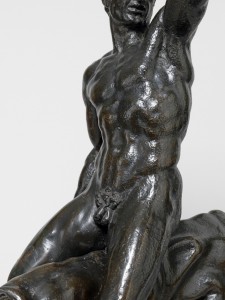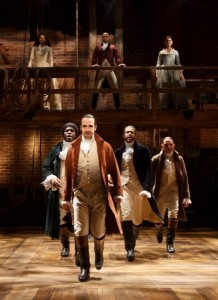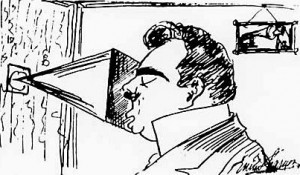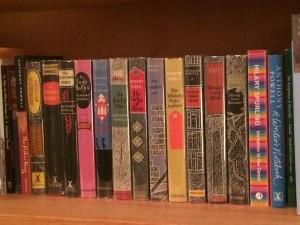In today’s Wall Street Journal “Sightings” column I take note of a group of “rediscovered” works of art from the past, and speculate on their larger cultural significance. Here’s an excerpt.
* * *
 The top story in the fine-art business is the “rediscovery” (if that’s the word—they were never lost) of a pair of privately owned bronze sculptures on display at England’s Fitzwilliam Museum. A team of art historians now thinks they were handmade by Michelangelo, the “Last Judgment” man. Should this new attribution stand up to scholarly scrutiny, they will be, so far as is known, the only surviving Michelangelo bronzes in the world.
The top story in the fine-art business is the “rediscovery” (if that’s the word—they were never lost) of a pair of privately owned bronze sculptures on display at England’s Fitzwilliam Museum. A team of art historians now thinks they were handmade by Michelangelo, the “Last Judgment” man. Should this new attribution stand up to scholarly scrutiny, they will be, so far as is known, the only surviving Michelangelo bronzes in the world.
Such tales are catnip to the press, which can be counted on to give them lavish play, as was the case when a previously unknown sonata movement composed in 1767 by the 11-year-old Mozart turned up three years ago in an Austrian attic. Much the same thing happened the other day when Random House, Dr. Seuss’ longtime publisher, announced that his widow had stumbled across a box containing the manuscript of an unpublished book by the popular children’s author called “What Pet Should I Get?” It’s being rushed into print, and will hit bookstores on July 28, two weeks after the publication of Harper Lee’s “Go Set a Watchman,” the hitherto unknown first draft of “To Kill a Mockingbird.”
What is it about stories like these that we find so unfailingly seductive? No doubt the “Antiques Roadshow” mentality is part of it. All of us love to suppose that the dusty canvas that Aunt Tillie left to us in her will is in fact an old master whose sale will make us rich beyond the dreams of avarice. And I’m sure that the fast-growing doubts surrounding “Go Set a Watchman” (which were well summarized in a Feb. 16 Washington Post story bearing the biting title of “To Shill a Mockingbird”) have pumped up its news value considerably.
But I smell something else in play. I suspect that for all its seeming popularity—as measured by such indexes as museum attendance—there is a continuing and pervasive unease with modern art among the public at large, a sinking feeling that no matter how much time they spend looking, reading or listening, they’ll never quite get the hang of it. As a result, they feel a powerful longing for “new” work by artists of the past.
To be sure, most ordinary folks like at least some modern art, but they gravitate more willingly to traditional fare. Just as “Our Town” (whose form, lest we forget, was ultramodern in 1938) is more popular than “Waiting for Godot,” so, too, are virtually all of our successful “modern” novels essentially traditional in style and subject matter. In some fields, domestic architecture in particular, midcentury modernism is still a source of widespread disquiet, while in others, like classical music and dance, the average audience member does little more than tolerate it. Shakespeare, Beethoven and “Swan Lake” remain to this day the cash cows of the American performing arts….
* * *
Read the whole thing here.
Mozart’s Allegro Molto in C Major, a freestanding sonata movement discovered in 2012 and played by Florian Birsak on the composer’s own fortepiano:


 Mrs. T and I just watched The Grand Budapest Hotel for the second time. When I first saw it last year, I’d read nothing by Stefan Zweig. Now I’ve read the standard biography of Zweig and several of his books—including Beware of Pity and The World of Yesterday, on which Wes Anderson specifically drew in writing the film—and I’ve also seen Max Ophüls’ screen version of Letter from an Unknown Woman. Anderson’s film makes quite a different impression when you understand how knowingly it relects its source material (though you can certainly enjoy and appreciate it without being aware of the nature of Zweig’s contribution). Not only is it a supremely effective homage flecked with touches of parody, but it’s also a masterpiece of total design, all the way down to the period typefaces chosen for the titles and subtitles.
Mrs. T and I just watched The Grand Budapest Hotel for the second time. When I first saw it last year, I’d read nothing by Stefan Zweig. Now I’ve read the standard biography of Zweig and several of his books—including Beware of Pity and The World of Yesterday, on which Wes Anderson specifically drew in writing the film—and I’ve also seen Max Ophüls’ screen version of Letter from an Unknown Woman. Anderson’s film makes quite a different impression when you understand how knowingly it relects its source material (though you can certainly enjoy and appreciate it without being aware of the nature of Zweig’s contribution). Not only is it a supremely effective homage flecked with touches of parody, but it’s also a masterpiece of total design, all the way down to the period typefaces chosen for the titles and subtitles. •
•  Pamela Paul, the editor of the New York Times Book Review, just did an excellent “By the Book”
Pamela Paul, the editor of the New York Times Book Review, just did an excellent “By the Book”  • Who is your favorite novelist ever? And your favorite who’s writing today? If we take “favorite” to be a purely personal judgment reflective of nothing but my individual taste, I’m increasingly inclined to say Anthony Powell. I can’t think of any contemporary novelist whose work means nearly as much to me (though I greatly admire V.S. Naipaul).
• Who is your favorite novelist ever? And your favorite who’s writing today? If we take “favorite” to be a purely personal judgment reflective of nothing but my individual taste, I’m increasingly inclined to say Anthony Powell. I can’t think of any contemporary novelist whose work means nearly as much to me (though I greatly admire V.S. Naipaul). • What’s the one book you wish someone else would write? A really good biography of Helen Frankenthaler.
• What’s the one book you wish someone else would write? A really good biography of Helen Frankenthaler.